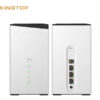What Are the Capabilities of Healthcare Mobile Computing?
In recent years, healthcare mobile computing has transformed the medical industry by revolutionizing how healthcare professionals access, process, and share patient information. The rapid adoption of mobile devices, cloud computing, and wireless networks in hospitals and clinics enhances clinical workflows, improves patient outcomes, and reduces operational costs. This article dives deep into the essential capabilities of healthcare mobile computing and highlights how devices like the Kingtop KP18M elevate hospital efficiency with cutting-edge technology and durable design. ⚕️📱
🔍 Understanding Healthcare Mobile Computing
Healthcare mobile computing refers to the use of portable computing devices and wireless technologies to facilitate healthcare delivery outside traditional desktop environments. It enables medical staff to perform critical functions such as patient data entry, remote diagnostics, telemedicine, medication management, and clinical decision-making anywhere within a healthcare facility or remotely. By integrating mobile computing into clinical workflows, hospitals achieve faster data access, improved communication, and better patient engagement, ultimately driving higher standards of care.
🛠️ Key Capabilities of Healthcare Mobile Computing
1. Real-Time Patient Data Access and Management
Mobile computing devices give healthcare providers instant access to electronic health records (EHRs) and patient history, reducing paperwork and enabling informed clinical decisions on the spot. Doctors and nurses can review test results, update treatment plans, and monitor vital signs in real time — speeding up diagnosis and care delivery.
This capability supports bidirectional referrals and patient information exchange between departments, improving care continuity and reducing medical errors.
2. Efficient Communication and Collaboration
Healthcare mobile devices facilitate seamless communication among multidisciplinary teams. Whether through secure messaging, voice calls, or video conferencing, mobile computing supports:
-
Remote consultations between specialists and frontline medical staff
-
Real-time updates on patient status
-
Coordinated care plans and collaborative decision-making
Devices with dual-band WiFi, 4G, 5G, and WiFi 6 technologies ensure high-speed, reliable connectivity, even in complex hospital environments with dense wireless traffic. 📶
3. Portable Diagnostic and Monitoring Tools
Mobile computing supports integration with portable diagnostic devices like pulse oximeters, ECG monitors, and portable ultrasound machines. This allows clinicians to:
-
Conduct point-of-care testing and imaging
-
Monitor patient conditions continuously
-
Collect and analyze data instantly
The result is improved responsiveness and timely interventions.
4. Mobility and Workflow Optimization
Healthcare mobile computing devices empower medical staff to move freely across wards, operating rooms, and outpatient clinics while maintaining connectivity. This flexibility:
-
Reduces time spent at fixed workstations
-
Minimizes delays in patient care
-
Optimizes task management via workflow apps
Mobile devices designed with ergonomics and durability in mind prevent downtime and maintain performance during long shifts.
5. Enhanced Data Security and Compliance
Healthcare demands stringent data protection due to patient privacy regulations like HIPAA and GDPR. Mobile computing solutions include:
-
Secure login and authentication
-
Encrypted data transmission
-
Remote device management and wipe capabilities
-
Compliance with medical-grade certifications
This ensures sensitive medical information remains confidential and protected from cyber threats.
🌟 Spotlight on Kingtop KP18M — The Best Partner of Medical Staff
To fully leverage healthcare mobile computing, hospitals need devices that combine performance, durability, and security. The Kingtop KP18M mobile terminal meets these needs with its advanced features designed specifically for medical environments.
🔸 Super Performance with MediaTek Dimensity 900
Powered by the MediaTek Dimensity 900 6nm octa-core processor, the KP18M offers:
-
High-speed data processing and multitasking
-
Smooth operation of healthcare apps and real-time data access
-
Support for dual-band WiFi, 4G, 5G, and WiFi 6, ensuring uninterrupted connectivity throughout hospital premises
This performance enables new interaction models between doctors and patients, such as remote collaboration and bidirectional referrals, significantly improving clinical efficiency.
🔸 Robust and Medical-Grade Protective Casing
The KP18M features a corrosion-resistant, easy-to-clean casing that withstands exposure to:
-
Medical solutions
-
Alcohol
-
Hydrogen peroxide
This ensures long device lifespan even in harsh hospital sanitation protocols, while maintaining hygiene standards essential for patient safety.
🔸 Multiple Output Interfaces and Versatile Connectivity
Equipped with versatile ports and wireless options, the KP18M connects effortlessly to:
-
External medical devices
-
Barcode scanners for medication verification
-
NFC readers for patient identification
Such connectivity accelerates clinical workflows and enhances data accuracy.
🔸 Designed for Healthcare Environments
Beyond ruggedness, the KP18M offers:
-
Ergonomic design suited for prolonged handheld use
-
Comprehensive security features for data protection
-
Compliance with hospital IT infrastructure
🚑 Real-World Applications of Healthcare Mobile Computing
| Application Area | Capability Supported | Benefits |
|---|---|---|
| Patient Information Access | Instant EHR retrieval and update | Faster diagnosis, reduced errors |
| Medication Administration | Barcode scanning for drug verification | Ensures correct medication, reduces adverse events |
| Remote Patient Monitoring | Wireless sensors and real-time data collection | Early detection of complications |
| Telemedicine | Video calls and remote diagnostics | Extends specialist care to remote locations |
| Asset and Inventory Tracking | Barcode scanning for equipment management | Optimizes resource utilization and maintenance |
🏥 Conclusion:
Healthcare mobile computing reshapes how medical staff interact with patient data and each other, driving faster, safer, and more coordinated care. The Kingtop KP18M stands out as an ideal device, blending high performance with medical-grade durability and connectivity. Its integration of MediaTek Dimensity 900, dual-band WiFi, 4G/5G, and robust protective casing meets the evolving demands of modern hospitals.
For healthcare providers looking to upgrade their mobile infrastructure, embracing advanced healthcare mobile computing solutions is no longer optional—it’s essential for delivering quality patient care in the digital age. 💡













Leave a reply